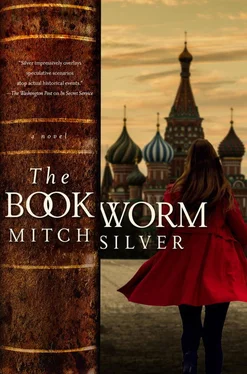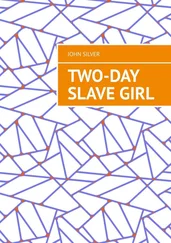But it was a third paper that he picked up now. He read it aloud, some sort of scientific report. Earlier the previous week—oh, this was in September of 1940, didn’t I say?—Himmler had given him a book, which he then turned over to the Kunsthistorisches to authenticate.
It was a Christian Bible, very old, and they were going on about when it was printed and where, with these absurd probabilities: seventy percent that it was from the Rhineland and thirty percent from eastern France. Crazy, minute details like that. The kind of ink, the kind of pen that was dipped in the ink. I remember dust samples had been put under an electron microscope. I’d never even heard of an electron microscope.
It was the wormhole that I remember. The report described this hole that went from the binding through the flyleaf and several pages of the Book of Genesis, partially obliterating some of the text, both handwritten and printed.
The Führer showed me the last line of the report: “The object thus analyzed is genuine in all respects. Heil Hitler!”
Then he turned on his heel to the massive map of Europe he was always studying. “There are exactly twenty rivers from that very window,” he nodded toward the one he’d been staring out of when I came in, “to Moscow. Twenty from the Wuhle to the Alte Oder all the way to the Moskva.” He ran his fingers over the map south to Italy. “Right there is Liguria. Duce was born in Liguria, and I myself on the Danube. I will tell you something, Speer, something I’ve never told anyone. My mother said that, on the morning I was born, a cow on my uncle’s farm gave birth to a two-headed calf.
“Then, when I was in the Army, in the trenches on the Somme, men on both sides of me were killed in the same instant and I was spared. Spared by the Almighty, so I might achieve…” he waved his hand in the air over the map of conquered Europe “…all this. Don’t you see? Triumph in the East is ordained !”
Of course I didn’t see. When he was going on like that I found it best to say nothing and wait for an explanation. But he didn’t explain.
Instead, he started in on this character in Die Walkure , Hunding, the husband cuckolded by his brother; Hunding and his helmet of ox horns. It was the horns he was thinking of, I suppose, the horns of a dilemma no less painful than those stage props.
“It is impossible.” He was leaning with both elbows on the map table. I thought he might actually put his head in his hands. “Here it is already September. Even if I postpone Sea Lion tonight, even if we mobilize tomorrow, we cannot invade the Soviet Union now, not with the Russian winter coming on. And yet, it is preordained.”
That’s when he handed me a sheet of paper that was lying on the map. I ran my eyes down the page, thinking it must be a battle order. It was poetry, of the strangest kind.
“I don’t quite see, mein Führer…”
Impatiently, he stabbed at it with his index finger. “There, there, in the third verse. At decade’s dawn . The prophecy specifies victory now. But we’re not ready.”
So, it was a prophecy. I read it again, this time noticing the part about the child of Germany picking up Barbarossa’s sword. I had to be honest. “I do not see the problem, mein Führer.”
“1940! The dawn of the decade! The year of my destiny, this very year, 1-9-4-0, is all but over!”
Then I understood. “Here, mein Führer, look at my fingers.” I spread my hands, palms outward. “If I count them, I go one, two, three, and so on, up to ten.”
“ Natürlich. ”
I’d learned to remain calm when he was agitated. “A decade has ten years, as I have ten fingers. One, two, three… so, the first year of a decade isn’t zero. It’s one.”
“You’re saying… the decade begins, not in 1940…”
“But in 1941. Exactly. You are, if this message from the past is to be believed, predestined to master the Slavic race next year, in 1941.”
Hitler sat down a little heavily in his chair, drained by all the excitement. “Very good, Speer. You can go.”
I clicked my heels and headed toward the door.
Hitler stopped me. “Speer.”
I turned back. “Yes, mein Führer?”
He smiled. “If you were anyone else and had played that game with me, by now you’d have only nine fingers.”
You see what I mean? What a sense of humor!
The joke was lost on Lara, but not the story’s significance: it was one more piece in the jigsaw proving that Noël Coward’s story really happened.
Chapter 30

Her stomach rumbled, reminding her she hadn’t eaten all day, when her phone rumbled too. Caller ID said “Grigoriy Gerasimov.” She’d forgotten to call.
“Glad I caught you, Lara. Look, I’m in the car… how about I pick you up for that practice session with the prompter?”
“I’m at the Osobyi Arkhiv for another quarter hour. Do you know where it is?”
“I’m on my way.”
Gerasimov was waiting for her at closing time not in a Mercedes—the standard choice of the Russian privileged class—but in a restored Alfa Romeo. She got in the little sports car and he drove her out of Moscow past the big War Memorial up there on the hill at Poklonnaya Gora. It wasn’t long before the thought came to her that she was living the dream, at least for the moment, of every unmarried woman in the faculty lounge, and not a few of the married ones—being whisked away in a convertible by a tall, dark Prince Charming.
“Are you hungry?” he asked.
“Starving.”
“Me too. We’ll eat before I take you back home.”
They took Vozdvizhenka Street westbound across the river to the Kutuzovsky Prospekt, joining the fleets of buses, trucks, taxis, private cars, and, everywhere, motorcycles heading for the M-1. Storm clouds were gathering overhead, big, dark thunderheads, and Gerasimov was worried that they would have to pull over and put up the top if it started to pour. He was going on about his car, how the Italians were great at bodywork but terrible with electronics. “Take the turn signals. No matter how much I spend, they never seem to work in the rain.”
When Lara tried to talk instead about the problems his change in her teaching schedule had caused, of what the superintendant was trying to pull with a vote of the Faculty Senate, he used a break in the traffic to speed up and pass a number of cars, increasing the wind noise and making conversation impossible.
So Lara didn’t get to complain that, on a call she’d just made from the Arkhiv, Nazimova had threatened her newest full professor if she made a stink in front of the Department. “Last in, first out,” she’d repeated, as if it were a commandment handed down by Moses. Then, to compound matters, Lara had told her in memorable language exactly how she’d felt. So now she’d probably have to write an apology. Ugh.
The traffic jam was a new, post-Soviet phenomenon, the inevitable consequence of Western consumerism coming late to an oil-glutted country. Try as she might to hold on to it, Lara felt her anger starting to seep away in the gathering gloom. Poking along, there was plenty of time to notice the enormous blue banners depicting the smiling world leaders of the G20 countries, two to a flag. Each of the dozens lining the fifty-meter-wide boulevard for more than a mile bore the single word, Vmeste! , and its English translation, Together! , at the bottom, as if the owners of the world’s twenty biggest economies—so often rattling sabers at each other—were in Moscow for a series of nice tête-à-têtes. Now that the motorcade had come and gone, dozens of workers were stacking the pedestrian barricades back on the trucks.
Читать дальше













